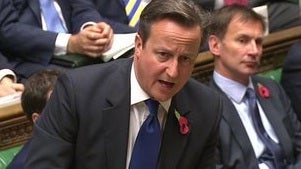Prime Minister’s Questions: an intricate debate that I scored six-nil to Miliband
Miliband won all the debating points about Europe and a referendum


Your support helps us to tell the story
From reproductive rights to climate change to Big Tech, The Independent is on the ground when the story is developing. Whether it's investigating the financials of Elon Musk's pro-Trump PAC or producing our latest documentary, 'The A Word', which shines a light on the American women fighting for reproductive rights, we know how important it is to parse out the facts from the messaging.
At such a critical moment in US history, we need reporters on the ground. Your donation allows us to keep sending journalists to speak to both sides of the story.
The Independent is trusted by Americans across the entire political spectrum. And unlike many other quality news outlets, we choose not to lock Americans out of our reporting and analysis with paywalls. We believe quality journalism should be available to everyone, paid for by those who can afford it.
Your support makes all the difference.Today’s was an intricate exchange that prefigured the general election campaign. It’s not a point-scoring exercise but, if it were, Ed Miliband won on all six of his questions. He asked how many other countries supported David Cameron’s renegotiation of Britain’s terms of EU membership.
Some countries’ leaders are privately cheering Cameron on, in the hope that they can benefit from his changes, but the Prime Minister couldn’t say that. So he said he had a plan and Miliband didn’t, and he was going to put his plan to the British people in a referendum.
Miliband question 2: “My view of the referendum is exactly the same as his was before he lost control of his party.” That’s the trouble with being against something before you are in favour of it: you need a reason for changing your mind and Cameron hasn’t got one. Two points to Miliband.
Cameron used his best prepared material in reply, quoting Alistair Darling from Monday’s Financial Times, which I noticed here. The former chancellor said that a referendum was inevitable: “It’s a boil that has to be lanced.”
Miliband had done his homework, however, and prefaced question 3 by saying that the boil that has to be lanced is the Prime Minister’s divided party. Three-nil.
Cameron replied by repeating that he had a plan and quoting the “shadow deputy leader of the House of Commons”. Journalists in the press gallery conferred. No idea. Dim recollection of disobliging remarks the previous week by a Labour MP of whom no one had heard, recently promoted to the front bench. Anyway, whoever it was said no one knew what Labour stood for and the party was “moribund”. This allowed the Prime Minister to describe Labour, unfunnily, as a dead parrot.
Miliband simply ignored the point, and it turned out that he was right to do so. Thomas Docherty, a Labour frontbencher, had said some honest things about the Scottish Labour Party last week when that opinion poll in Scotland put the SNP on 57 seats and Labour on one.
His actual words were: “We have a moribund party in Scotland.” Cameron left out the words “in Scotland”.
Miliband question 4: The Prime Minister used to say he would never campaign to leave the European Union. Would he care to repeat that now? Strictly, Miliband was also guilty of misquotation. After PMQs the source of that alleged quotation was tracked down and the word “never” is The Daily Telegraph’s paraphrase. But in the same interview in July 2012 Cameron also said that to withdraw from the EU “would be a complete denial of our national interests”. So Miliband was entitled to ask if that position held.
And, of course, it doesn’t.
Cameron replied that he wanted to stay in a “reformed EU, but we need a referendum”. With that “but” he conceded the argument. He wants to stay in a reformed EU and the plain meaning of that is that, if the EU cannot be reformed, he would want to leave. Four-nil to Miliband.
Miliband question 5: note that question 4 had not been answered and repeat it.
The Prime Minister was now reduced to quoting Ian Austin, the Brownite-turned-Blairite MP for Dudley North. (What’s the difference between a Brownite and a Blairite? About three years.) Austin said that the failure to impose transitional controls on the free movement of workers from new EU countries in 2004 had been a mistake. Cameron demanded that Miliband say sorry. But Miliband has already said it was a mistake and has used the “apologise” word.
So he ignored that too and asked his sixth and final question. It wasn’t a question at all, of course. Very few of them are, but he didn’t even pretend this was. He said that British business would be holding its head in its hands at Cameron’s willingness to contemplate departure from the EU, and said: “He’s a Don’t Know Prime Minister.”
As I say, six-nil to Miliband.
That is the scoring of formal debate. It was a weak show from Cameron, who is usually a sharp and effective debater.
But the politics were very different. Most people would think that Cameron has changed his mind from the wrong position to the right position of being in favour of a referendum, and, on the substance, Cameron wants changes in Europe while Miliband doesn’t. In the general election campaign, “reform Europe” will prevail over “leave Europe as it is”.
Join our commenting forum
Join thought-provoking conversations, follow other Independent readers and see their replies
Comments